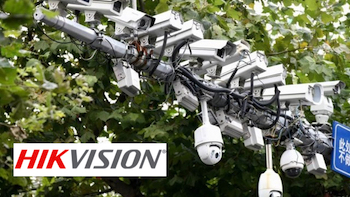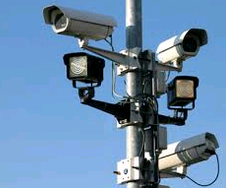
Imagine a world where almost everyone can be tracked, and everything can be seen by cameras linked directly to the Chinese government.
The rapid growth of a little known Chinese manufacturer of high-powered surveillance technology has some people concerned that it’s no longer a theory.
Hangzhou Hikvision Digital Technology, a company controlled by the Chinese government, is now the world’s largest supplier of video surveillance equipment, with internet-enabled cameras installed in more than 100 countries.
Capable of capturing sharp images even in fog, rain or darkness, Hikvision claims its most advanced technologies can recognize license plates and tell if a driver is texting while behind the wheel. They can also track individuals with unrivaled “face-tracking” technology and by identifiers such as body metrics, hair color and clothing.
In the United States alone, the company’s surveillance systems can be found everywhere from prisons to airports to private homes and public schools, and even in places with sensitive national security concerns, such as Fort Leonard Wood military base in Missouri. Abroad, its cameras were installed in the U.S. embassy in Kabul, Afghanistan.
According to a U.S. government procurement document, U.S. embassy officials decided in August 2016 to allow only Hikvision suppliers to bid on the installation contract.
Stephen Bryen, a widely published expert on international affairs and cyber security, wrote an article outlining his concerns about the purchase, saying the Hikvision cameras were never proven to be any more secure than comparable models.
?If the procurement officer actually thought these cameras were more secure than others, that would have been claimed as part of the sole-source justification,? he said of the embassy purchase agreement, adding that no claims of any kind were made regarding the Hikvision products.
?The issue is that the U.S. embassy is installing commercial cameras in one if its most sensitive locations,? Bryen wrote. ?This is a big mistake, and mistakes like this can cost lives.?
On Monday, a State Department official confirmed the installation via email.
“A Hikvision camera system was initially installed to monitor non-sensitive electrical closets for theft prevention,” the official said of U.S. Embassy Kabul. “The procurement in question was to either expand this or to install a new system. The procurement was cancelled September 2016 and the previously installed cameras were removed.”
It is not known whether other Hikvision products have ever been installed in other U.S. embassies.
Spreading The Word
Edward Long, a former employee of a video surveillance equipment company in Florida, recently petitioned the U.S. government with a letter warning that Hikvision cameras are sending information back to China.
?Over the past year, [Hikvision has] … flooded the United States with their equipment,? he wrote. ?Every time one of their machines is plugged into the internet, it sends all your data to three servers in China. With that information, the Chinese government can log in to any camera system, anytime they want.?
Frank Fisherman, a general manager for Long?s former employer, IC Realtime Security Solutions, tells VOA that Hikvision devices are engineered for effortless hacking.
?They have their encrypted information set up so they can access even if you change the admin [passwords] and the firewall,? he said, adding that Hikvision may have set aside a “back door” in the production process, such that the manufacturer can monitor devices remotely without the users being aware.
A Beijing Incubator Company
Established in 2001, Hikvision, which originated as a Chinese government research institute, maintains strong ties with that government. More than 42 percent of the company is owned by China?s state-owned enterprises, with the remaining stock owned by a combination of general public stockholders and venture capital investors, including 18 percent from private equity in Hong Kong.
In 2015, when Chinese President Xi Jinping went on an inspection tour of the southern city of Hangzhou, capital of Zhejiang Province, he visited Hikvision’s main office instead of the famous Alibaba headquarters. Xi also met with Pu Shiliang, 38, Hikvision’s head of research and development.
According to the official website of Zhejiang Police Academy, Pu is also the director of a technology laboratory within China?s Ministry of Public Security, the main domestic security agency that has long been criticized for tracking and detaining dissidents and perceived Communist Party opponents of any stripe.
Beginning in 2015, China’s state Development Bank and Export-Import Bank provided Hikvision with 20 billion yuan (nearly $3 billion) in low-interest loans and a 20 billion yuan line of credit. Loans of this size are typically unavailable to Chinese or foreign companies.
Invisible to consumers
Despite the enormous security implications, the United States appears to have made no national security assessment of Hikvision products. As indicated by Long?s online petition, which ultimately closed with only 15 supporters, Hikvision’s links to Beijing are virtually invisible to American consumers.
In April, a New York Times report addressed similar concerns about Chinese drone maker DJI ? the world’s largest manufacturer of small drones. The report says the company issued a user agreement that warns customers: “if you conduct your flight in certain countries, your flight data might be monitored and provided to the government authorities according to local regulatory laws.”
In Britain, where many Hikvision cameras have been installed, some government officials have begun voicing concerns.
?If you’ve got cameras that are IP enabled, or potentially could covertly be so enabled … they could potentially be used for malign purposes,? Nigel Inkster, a former British intelligence official, told The Times.
Canadian-based Genetec, one of the world’s leading video surveillance software companies, recently announced that it would no longer offer free technical support for products from either Hikvision or Huawei —a Shenzen-based multinational networking and telecommunications equipment and services company— citing ongoing “security considerations.”
Issuing the announcement, Genetec cited government and corporate clients who called Hikvision and Huawei products “too risky.”
Voice of America received no response to multiple attempts to contact Hikvision?s headquarters in Hangzhou and its branch in California.
Jeffrey He, president of Hikvision?s U.S. and Canadian branch, defended the company during an undated interview with U.S. security monitoring website SourceSecurity.com.
“There have been some misguided accusations targeting Hikvision?s public and industry image, sometimes seeking to create controversy where none exists,” he said. “These questions are geared in general not just to Hikvision, but also to many Chinese manufacturers, and none of these accusations have been proven to be true. These accusations are baseless.
“The Cold War was officially over when the Berlin Wall came down, but I am seeing that, in the minds of some, it never ended,” he added. “We all would be better served if, instead of living in the past, we would look toward the future and the realities of world changes and technology changing along with it.?
Hikvision now has 35 branches in mainland China and 21 overseas subsidiaries with more than 18,000 employees.
About The Author
Xiao Yu
Voice of America


